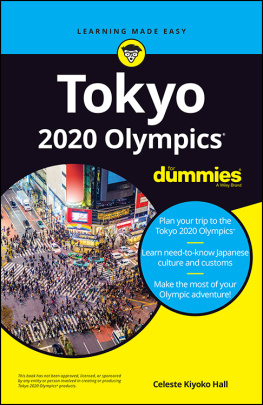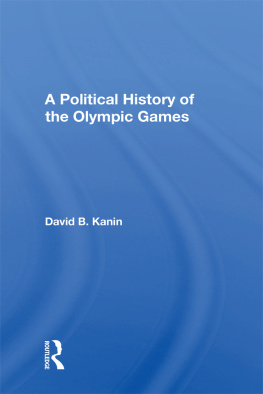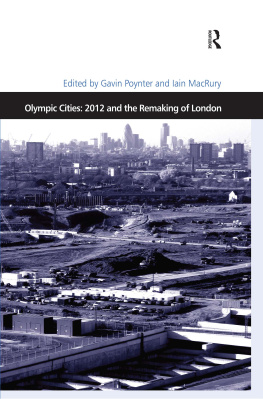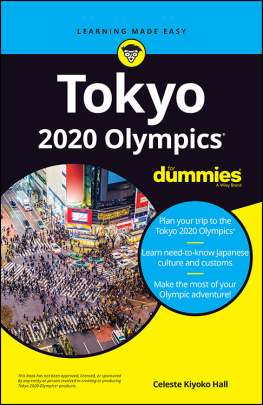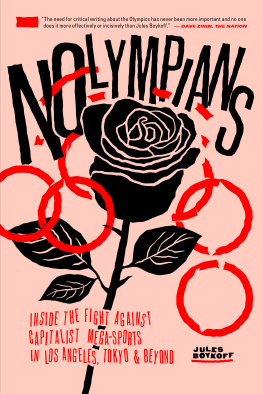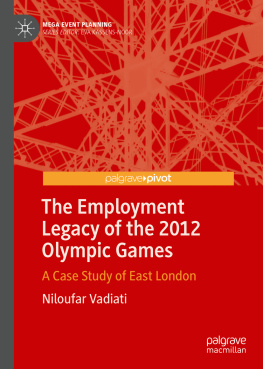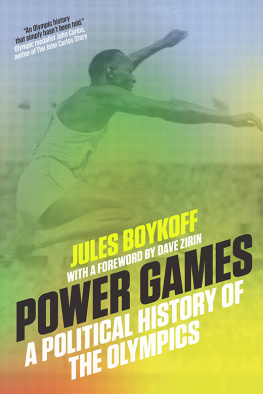
Once again, Rodanthi Tzanelli offers a high-quality and promising book, where she theorizes on the cultural borders of the Olympic City in the ceremonials of Rio 2016 and Tokyo 2020. With delightful prose, her development exhibits a fertile ground to understand media events as the juxtaposition of two economic forms: the artificial economy, which focuses on the doctrine of security; and the economy of imagination, more oriented to the production of architectural legacies as artificially fabricated and externally imposed.
Korstanje Maximiliano, University of Palermo, Argentina
This book makes a major contribution to understanding mega-events through a cultural sociological analysis. Grounded in a multi-disciplinary literature, it will appeal to readers coming from a wide range of perspectives. The central theme of Mega-Events as Economies of the Imagination provides an innovative and compelling lens through which to understand and explore mega-events.
Paul Lynch, Professor of Critical Hospitality and Tourism, The Business School, Edinburgh Napier University, UK
The planning of Olympic mega-events for Rio 2016 and Tokyo 2020 involved not just pragmatic aspects of logistics and engineering, but also what Rodanthi Tzanelli describes as imagineering. This fascinating study of global mega-events brings together recent theoretical approaches to atmospheres, aesthetics, technologies, economic development, infrastructural urbanism, hypermobility, and dark tourism to give us new insights into the staging of mobile situations and their symbolic choreomobilities. It is an intriguing contribution to the literature on mobilities, global urbanism, and the performative arts.
Mimi Sheller, Professor of Sociology, Department of Sociology, Drexel University, USA
Mega-Events as Economies of the Imagination
Atmosphere, the elusive ambiance of a place, enables or hinders its mobility in global consumption contexts. Atmosphere connects to social imaginaries, utopian representational frames producing the culture of a city or country. But who resolves atmospheric contradictions in a places social and cultural rhythms, when the eyes of the world are turned on it?
Mega-Events as Economies of the Imagination examines ephemeral and solidified atmospheres in the Rio 2016 Olympic Games and the Handover Ceremony to Tokyo for the 2020 Games. Indeed, highlighting the various social and cultural implications upon these Olympic Games hosts, Tzanelli argues that the Olympic City is produced by aesthetic imagineers, mobile groups of architects, artists and entrepreneurs, who aesthetically engineer native cultures as utopias. Thus, it is explored as to how Rio and Tokyos imagineers problematise notions of creativity, cosmopolitan togetherness and belonging.
Mega-Events as Economies of the Imagination will appeal to postgraduate students, postdoctoral researchers and professionals interested in fields such as: Globalisation Studies, Mobility Theory, Cultural Sociology, International Political Economy, Conference and Event Management, Tourism Studies and Migration Studies.
Rodanthi Tzanelli is Associate Professor of Cultural Sociology at the University of Leeds, UK.
Routledge Advances in Sociology
For a full list of titles in this series, please visit www.routledge.com/series/SE0511.
Twentieth Century Population Thinking
A Critical Reader of Primary Sources
Edited by Population Knowledge Network
The Synchronization of National Policies
Ethnography of the Global Tribe of Moderns
Pertti Alasuutari
Retail and the Artifice of Social Change
Steven Miles
Theorizing Social Memories
Concepts and Contexts
Edited by Gerd Sebald and Jatin Wagle
Addiction, Modernity, and the City
A Users Guide to Urban Space
Christopher B.R. Smith
Medicine, Risk, Discourse and Power
Edited by John Martyn Chamberlain
Pragmatic Humanism
On the Nature and Value of Sociological Knowledge
Marcus Morgan
Shared Experiences of Mass Shootings
A Comparative Perspective on the Aftermath
Johanna Nurmi
Mega-Events as Economies of the Imagination
Creating Atmospheres for Rio 2016 and Tokyo 2020
Rodanthi Tzanelli
Mega-Events as Economies of the Imagination
Creating Atmospheres for Rio 2016 and Tokyo 2020
Rodanthi Tzanelli
First published 2018
by Routledge
2 Park Square, Milton Park, Abingdon, Oxon OX14 4RN
and by Routledge
711 Third Avenue, New York, NY 10017
Routledge is an imprint of the Taylor & Francis Group, an informa business
2018 Rodanthi Tzanelli
The right of Rodanthi Tzanelli to be identified as author of this work has been asserted by her in accordance with sections 77 and 78 of the Copyright, Designs and Patents Act 1988.
All rights reserved. No part of this book may be reprinted or reproduced or utilised in any form or by any electronic, mechanical, or other means, now known or hereafter invented, including photocopying and recording, or in any information storage or retrieval system, without permission in writing from the publishers.
Trademark notice: Product or corporate names may be trademarks or registered trademarks, and are used only for identification and explanation without intent to infringe.
British Library Cataloguing in Publication Data
A catalogue record for this book is available from the British Library
Library of Congress Cataloging in Publication Data
A catalog record for this book has been requested
ISBN: 978-1-138-30028-6 (hbk)
ISBN: 978-1-315-13615-8 (ebk)
For Majid, as always
The books thesis benefitted from Populations Mobilities, a reading group hosted by the Bauman Institute and the Centre for Ethnicity and Racism Studies at Leeds in 201516. I am grateful for discussions with the groups regular members (Adrian Favell, Austin Harrington, Thomas Campbell, Ruth Holliday, Bobby Sayyid and Mark Davis). Discussions with Maximiliano Korstanje (University of Buenos Aires, Argentina) and Nelson Graburn (University of Berkeley) on things we (dis)agree on have also been valuable.
I remain in debt to two scholars who acted as my teachers in theory: John Urry, with whom I interacted in person over the years, and Zygmunt Bauman, with whom I never did, but whose work I consumed voraciously, if not fast enough.
The clash between thanatology and hope, as well as the ways of escape we devise from disaster, were inspired by my Greek and Pakistani families, who make ends meet in the current socio-economic climate. A word of gratitude goes to my companion, Majid Yar: his intellectual and moral support has been invaluable; his invisible labour as homemaker helped me create some of the following pages; and his presence in my scholarly discourse is significant.
Mega-events: enterprises of time, explosions of spaces, non-spaces



